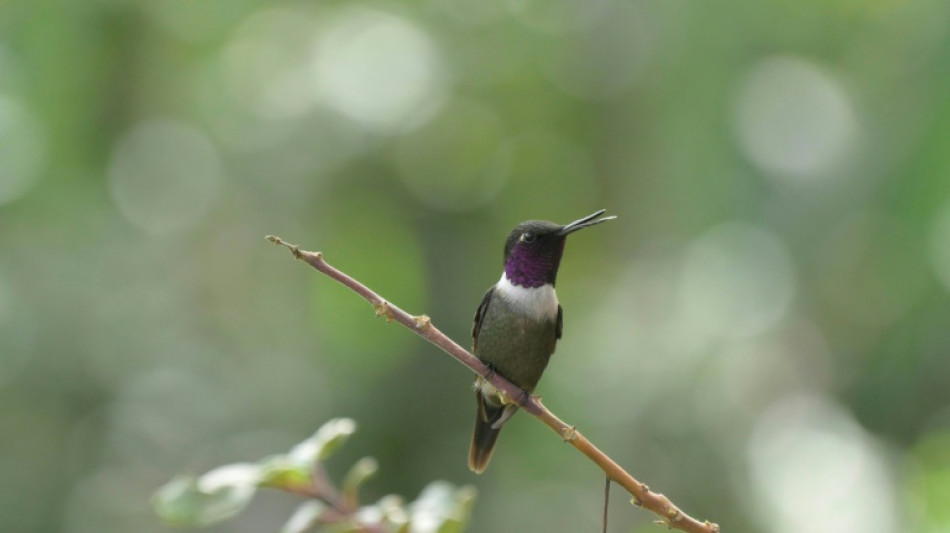
-
 France detects Russia-linked Epstein smear attempt against Macron
France detects Russia-linked Epstein smear attempt against Macron
-
Winter Olympics to open with star-studded ceremony

-
 Trump posts, then deletes, racist clip of Obamas as monkeys
Trump posts, then deletes, racist clip of Obamas as monkeys
-
Danone expands recall of infant formula batches in Europe

-
 Trump deletes racist video post of Obamas as monkeys
Trump deletes racist video post of Obamas as monkeys
-
Colombia's Rodriguez signs with MLS side Minnesota United

-
 UK police probing Mandelson after Epstein revelations search properties
UK police probing Mandelson after Epstein revelations search properties
-
Russian drone hits Ukrainian animal shelter

-
 US says new nuclear deal should include China, accuses Beijing of secret tests
US says new nuclear deal should include China, accuses Beijing of secret tests
-
French cycling hope Seixas dreaming of Tour de France debut

-
 France detects Russia-linked Epstein smear attempt against Macron: govt source
France detects Russia-linked Epstein smear attempt against Macron: govt source
-
EU nations back chemical recycling for plastic bottles

-
 Terror at Friday prayers: witnesses describe blast rocking Islamabad mosque
Terror at Friday prayers: witnesses describe blast rocking Islamabad mosque
-
Iran expects more US talks after 'positive atmosphere' in Oman

-
 US says 'key participant' in 2012 attack on Benghazi mission arrested
US says 'key participant' in 2012 attack on Benghazi mission arrested
-
Why bitcoin is losing its luster after stratospheric rise

-
 Arteta apologises to Rosenior after disrespect row
Arteta apologises to Rosenior after disrespect row
-
Terror at Friday prayers: witness describes 'extremely powerful' blast in Islamabad

-
 Winter Olympics men's downhill: Three things to watch
Winter Olympics men's downhill: Three things to watch
-
Ice dancers Chock and Bates shine as US lead Japan in team event

-
 Stellantis takes massive hit on 'overestimation' of EV demand
Stellantis takes massive hit on 'overestimation' of EV demand
-
Stocks rebound though tech stocks still suffer

-
 Spanish PM urges caution as fresh rain heads for flood zone
Spanish PM urges caution as fresh rain heads for flood zone
-
Iran says to hold more talks with US despite Trump military threats

-
 Russia accuses Kyiv of gun attack on army general in Moscow
Russia accuses Kyiv of gun attack on army general in Moscow
-
Cambodia reveals damage to UNESCO-listed temple after Thailand clashes

-
 Norway crown princess 'deeply regrets' Epstein friendship
Norway crown princess 'deeply regrets' Epstein friendship
-
Italy set for Winter Olympics opening ceremony as Vonn passes test

-
 England's Jacks says players back under-fire skipper Brook '100 percent'
England's Jacks says players back under-fire skipper Brook '100 percent'
-
Carrick relishing Frank reunion as Man Utd host Spurs

-
 Farrell keeps the faith in Irish still being at rugby's top table
Farrell keeps the faith in Irish still being at rugby's top table
-
Meloni, Vance hail 'shared values' amid pre-Olympic protests

-
 Olympic freestyle champion Gremaud says passion for skiing carried her through dark times
Olympic freestyle champion Gremaud says passion for skiing carried her through dark times
-
US urges new three-way nuclear deal with Russia and China

-
 Indonesia landslide death toll rises to 74
Indonesia landslide death toll rises to 74
-
Hemetsberger a 'happy psychopath' after final downhill training

-
 Suicide blast at Islamabad mosque kills at least 31, wounds over 130
Suicide blast at Islamabad mosque kills at least 31, wounds over 130
-
Elton John accuses UK tabloids publisher of 'abhorrent' privacy breaches

-
 Lindsey Vonn completes first downhill training run at Winter Olympics
Lindsey Vonn completes first downhill training run at Winter Olympics
-
Digital euro delay could leave Europe vulnerable, ECB warns

-
 Feyi-Waboso out of England's Six Nations opener against Wales
Feyi-Waboso out of England's Six Nations opener against Wales
-
Newcastle manager Howe pleads for Woltemade patience

-
 German exports to US plunge as tariffs exact heavy cost
German exports to US plunge as tariffs exact heavy cost
-
Portugal heads for presidential vote, fretting over storms and far-right

-
 Suicide blast at Islamabad mosque kills at least 30, wounds over 130: police
Suicide blast at Islamabad mosque kills at least 30, wounds over 130: police
-
Russia says Kyiv behind Moscow shooting of army general

-
 Greenland villagers focus on 'normal life' amid stress of US threat
Greenland villagers focus on 'normal life' amid stress of US threat
-
Iran, US hold talks in Oman after Trump military threats

-
 Stocks waver as tech worries build
Stocks waver as tech worries build
-
Dupont, Jalibert click to give France extra spark in Six Nations bid


To find out how wildlife is doing, scientists try listening
A reedy pipe and a high-pitched trill duet against the backdrop of a low-pitched insect drone. Their symphony is the sound of a forest, and is monitored by scientists to gauge biodiversity.
The recording from the forest in Ecuador is part of new research looking at how artificial intelligence could track animal life in recovering habitats.
When scientists want to measure reforestation, they can survey large tracts of land with tools like satellite and lidar.
But determining how fast and abundantly wildlife is returning to an area presents a more difficult challenge -- sometimes requiring an expert to sift through sound recordings and pick out animal calls.
Jorg Muller, a professor and field ornithologist at University of Wurzburg Biocenter, wondered if there was a different way.
"I saw the gap that we need, particularly in the tropics, better methods to quantify the huge diversity... to improve conversation actions," he told AFP.
He turned to bioacoustics, which uses sound to learn more about animal life and habitats.
It is a long-standing research tool, but more recently is being paired with computer learning to process large amounts of data more quickly.
Muller and his team recorded audio at sites in Ecuador's Choco region ranging from recently abandoned cacao plantations and pastures, to agricultural land recovering from use, to old-growth forests.
They first had experts listen to the recordings and pick out birds, mammals and amphibians.
Then, they carried out an acoustic index analysis, which gives a measure of biodiversity based on broad metrics from a soundscape, like volume and frequency of noises.
Finally, they ran two weeks of recordings through an AI-assisted computer programme trained to distinguish 75 bird calls.
- More recordings needed -
The programme was able to pick out the calls on which it was trained in a consistent way, but could it correctly identify the relative biodiversity of each location?
To check this, the team used two baselines: one from the experts who listened to the audio recordings, and a second based on insect samples from each location, which offer a proxy for biodiversity.
While the library of available sounds to train the AI model meant it could only identify a quarter of the bird calls the experts could, it was still able to correctly gauge biodiversity levels in each location, the study said.
"Our results show that soundscape analysis is a powerful tool to monitor the recovery of faunal communities in hyperdiverse tropical forest," said the research published Tuesday in the journal Nature Communications.
"Soundscape diversity can be quantified in a cost-effective and robust way across the full gradient from active agriculture, to recovering and old-growth forests," it added.
There are still shortcomings, including a paucity of animal sounds on which to train AI models.
And the approach can only capture species that announce their presence.
"Of course (there is) no information on plants or silent animals. However, birds and amphibians are very sensitive to ecological integrity, they are a very good surrogate," Muller told AFP.
He believes the tool could become increasingly useful given the current push for "biodiversity credits" -- a way of monetising the protection of animals in their natural habitat.
"Being able to directly quantify biodiversity, rather than relying on proxies such as growing trees, encourages and allows external assessment of conservation actions, and promotes transparency," the study said.
E.Qaddoumi--SF-PST



